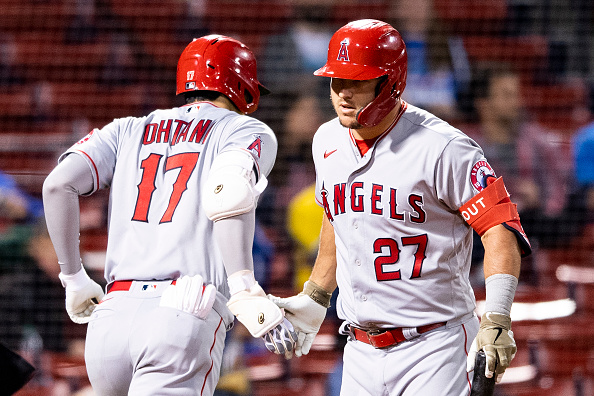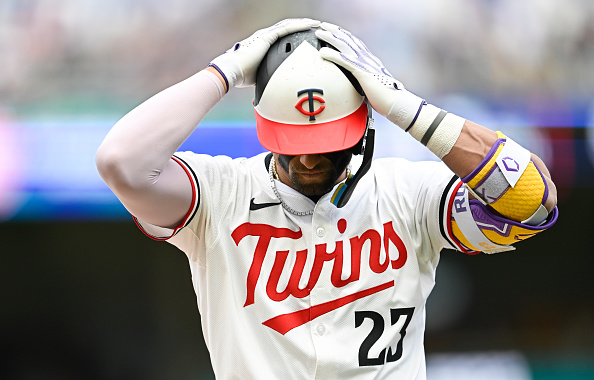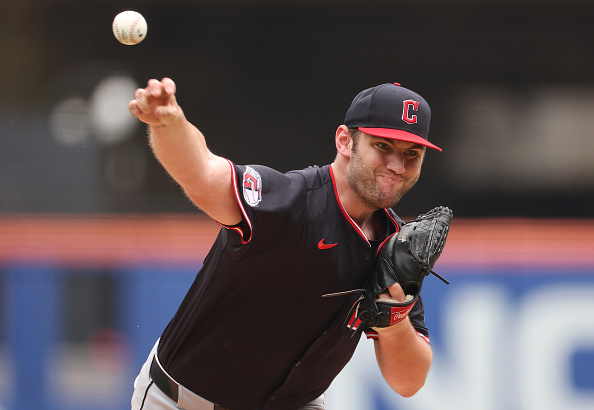After completing the franchise’s 60th season this year, the Los Angeles Angels have only won a single World Series. Yet, they have arguably had the greatest power pitcher and all-around player of that era wear their uniform. From Nolan Ryan to Mike Trout. Reggie Jackson to Albert Pujols. Rod Carew to Shohei Ohtani. The Halos have been blessed with some of the biggest names in the sport during their first half-century plus.
Despite having these legends on their rosters, only Vladimir Guerrero dons an Angels’ cap in Cooperstown’s Hall of Fame. Nolan Ryan’s four no-hitters and 383-strikeout season were not enough to keep that Rangers hat off of his plaque. Here you will find the Express on this list with four other starting pitching greats from the past 60 years. Hence, the exercise of examining the Los Angeles, Anaheim, California Angels all-time 26-man roster.
Make sure to check out all of our other All-Time Rosters.
Starting Nine
Bob Boone, C
Arriving as a 34-year-old free agent in 1982, the two-time Gold Glove winner only seemed to get better. The veteran earned four more Gold Gloves during his seven seasons in Anaheim. His leadership with pitching staff and defense helped two of those teams reach the ALCS in 1982 and 1986.
During his tenure with the Angels, he stood out as the best defender at his position. The next closest Fangraphs defensive score among catchers to Boone’s 136.8 was Hall of Famer Gary Carter’s 101 rating. In an era where defense was valued over offense behind the plate, he was among the best of all time. One can make the argument that Boone is the greatest catcher not included in the National Baseball Hall of Fame.
Darin Erstad, 1B
Most think of Erstad as an outstanding outfielder during his Angels career. Many forget he played his first three full seasons and his last as the Halos primary first baseman. He collected his third career Gold Glove at first in 2005 after earning his first pair as a left fielder and center fielder.
A clubhouse leader and superior defender, Erstad was a clutch performer batting up and down the Halos batting order. He was an All-Star at the position in 1998, hitting .296 with 39 doubles, 19 home runs, and 20 stolen bases. The North Dakota native’s overall career with Angels gives him an edge over Carew and Wally Joyner at first base.
Bobby Grich, 2B
The three-time Orioles All-Star joined the Angels as a free agent prior to the 1977 season. One of the premier defensive second basemen of his era, Grich was named to three more All-Star teams in California. He led the American League with 22 home runs, a 165 OPS+, and a .543 slugging percentage in 1981.
He was a critical part of the first three Angels postseason teams in 1979, 1982, and his final season of 1986. Since 1969, Grich’s 69.2 Fangraphs WAR trails only Joe Morgan as the best among second basemen. His WAR is greater than Hall of Famers at the position like Roberto Alomar, Craig Biggio, and Ryne Sandberg. Not only is Grich the greatest second baseman in franchise history, but he also deserves serious consideration of a place in Cooperstown.
Troy Glaus, 3B
The SoCal native seemed destined to be a Halo when selected with the third overall pick in 1997 out of UCLA. An All-Star in three of his seven seasons in Anaheim, the 6-foot-5 slugger won back-to-back Silver Sluggers in 2000 and 2001. His AL-leading 47 home runs in 2000 were the most ever by an AL third baseman at the time.
Still, his finest moment came as the 2002 World Series MVP, producing a 1.313 OPS for the champion Angels. He earns his place at this position on the all-time team over the father of his college teammate Tim DeCinces.
Jim Fregosi, SS
If there were a Mr. Angel at the end of their first decade, it would undoubtedly be Jim Fregosi. The 35th pick in their 1960 expansion draft played for the club the first eleven years of existence. Named to six American League All-Star teams, the Gold Glove shortstop was the best at his position for the decade.
Ultimately traded to the Mets in exchange for Nolan Ryan, Fregosi finished his Halos career tops in most offensive categories. His 70 career triples still mark a franchise career best. Later he would lead the Angels to their first postseason appearance as the manager of the 1979 Western Division champions.
Garret Anderson, LF
G.A. accumulated 2,368 of his 2,529 career base hits during his 15 seasons in Anaheim. A three-time All-Star with the team, Anderson led the AL in doubles back-to-back seasons in 2002 and 2003. He was crowned champion of the 2003 All-Star Homerun Derby in Chicago.
His 2,013 games with the team are the most games played in an Angels uniform ever. No one has more hits, runs scored, runs batted in, singles, doubles, and total bases wearing a Halo than Anderson. Enough to keep other longtime left fielder Brian Downing out of this starting lineup.
Mike Trout, CF
Only 11 seasons into his MLB career, Trout’s 76.1 WAR is 30 wins higher than Jim Fregosi’s next best rating. Arguably, the greatest player of his era, Trout’s 1.002 OPS, 310 home runs, and 1,236 runs created are franchise bests. The three-time American League MVP has finished first or second in voting seven of eight seasons 2012 through 2019.
The 30-year-old center fielder is the greatest Angel of all time with nine more seasons remaining on his current contract. Trout’s legacy expands well beyond this list and the superlatives are never-ending for one of the greatest players ever.
Vladimir Guerrero, RF
Vlad’s six seasons with the Angels is the shortest tenure of any player on this list. Fans in Anaheim benefit from seeing Guerrero spend the prime of his career with the Halos. The Dominican slugger was an All-Star four of his six seasons in Anaheim.
Vladdy would run away with the 2004 AL MVP in his debut season with the club. Hitting .337 with 39 home runs, and 126 RBI on his way to earning his only Most Valuable Player award. He honored the franchise with their first Baseball Hall of Fame inductee to don an Angels’ cap in 2018.
Tim Salmon, DH
Known as King Fish or Mister Angel to many during his 14 MLB seasons spent entirely with the Halos, Salmon’s legacy around baseball is most likely as the greatest player to never be named an All-Star. The 1994 Rookie of the Year was an annual slow starter at the plate who finished Top 10 in MVP voting twice.
Salmon trails only Anderson in most significant career offensive statistics. Salmon’s 299 career home runs were franchise-best prior to Mike Trout passing him last year. A solid defender in right field, injuries would force him to spend his final seasons as the team’s designated hitter.
Starting Rotation
Nolan Ryan, RHP
The future Hall of Fame hurler would spend the prime of his career in Anaheim from 1972 to 1979. The Express tossed four of his record seven no-hitters as a member of the club. His amazing 383 strikeouts during the 1973 campaign is a single-season record that may never be broken. Ryan’s powerful performance is so legendary, he was the first pitcher clocked at 100 mile-per-hour.
While he amazingly never won a Cy Young, he was an All-Star five of his eight years in Anaheim. The Texan’s 2,516 strikeouts, 156 complete games, and 40 shutouts are career bests with the Halos. Nolan Ryan would return to his home state and end his career with the Astros and Rangers. Still, it’s his time in Anaheim, before readily available cable networks and televised games, that were his best seasons.
Chuck Finley, LHP
Finley spent the first 14 of his 17 MLB seasons with the Angels. His 52.0 career WAR is twelve points higher than Ryan’s 40.0 with the team. The 165 victories, 379 starts, and 2,675 innings pitched are more than any other Angels pitcher.
A four-time All-Star, Finley won 15 or more games six times in Anaheim. The 6-foot-6 lefty was 18-9 with 2.40 ERA and 177 strikeouts in 1990. The tall Louisiana native finished second in AL Cy Young Award voting that season, leading a staff that included fellow southpaws Mark Langston and Jim Abbott.
Jered Weaver, RHP
The three-time All-Star was one of the American League’s most dominant starters between 2011 and 2014. Weaver registered 20 victories in 2012 and 18 in 2014 led the AL in those categories. The Dream Weaver finished top five in Cy Young voting three straight seasons between 2010 through 2012.
After eleven seasons with Angels, his 150 victories, 322 games started, .617 winning percentage are second-best in club history. This clearly secures Weaver’s inclusion on the Mount Rushmore of Halos starting pitchers.
Frank Tanana, LHP
The colorful southpaw entered the league at 19 years old with the Halos in 1973. Nolan Ryan and he would make up the best one-two rotation combo in baseball for most of the Seventies. Coining the phrase from many opposing lineups of “Tanana and Ryan and two days of cryin’.”
The lefty’s 269 strikeouts in 1975 and 2.54 ERA in 1977 led the American League. The three-time All-Star finished third in Cy Young voting in 1976 with 19 wins, 2.43 ERA, and 261 strikeouts. His power pitching performance would taper off later in his career that spanned 21 MLB seasons.
Dean Chance, RHP
The right-hander spent the first six years of his 11 MLB seasons as a member of the Angels staff. He finished third in Rookie of the Year voting in 1962 but would break through in 1964, leading the AL with 20 victories, a 1.65 ERA, 15 complete games, and 11 shutouts on way to winning the Cy Young Award. The first and only Angels pitcher to earn the award besides Bartolo Colon.
Chance’s 2.83 ERA as a Halo is second best for an Angels pitcher during his career with the team. Chance would leave the Angels and become an All-Star in Minnesota but remained best remembered as the Halos ace.
Bullpen
Troy Percival, RHP (closer)
The converted minor league catcher’s 316 saves and 579 games pitched are the most in franchise history. The team’s closer for 1996 through 2004, Percival finished every season with 27 or more saves. He began his career as the set-up man for future Hall of Famer Lee Smith in 1995. Eventually ending his tenure with the Halos with Francisco Rodriguez in that set-up role for him in 2004.
Percy saved seven of the Angels’ 11 playoff victories, highlighted by the World Series-clinching Game Seven in 2002, forever cementing his legacy as the greatest closer in franchise history.
Francisco Rodriguez, RHP
Making his MLB debut with five regular-season appearances in 2002, K-Rod would be thrust into the national spotlight immediately. He appeared in 11 October postseason games, striking out 28 hitters in 18.2 innings pitched. While he wasn’t named MVP of a series, the Angels likely would not have won the Series without him.
The young Dominican struck out 123 batters in 84 innings as the set-up man for Percival in 2004. Rodriguez would graduate to the closer role the following season. He served in that capacity the last four seasons of this tenure through 2008. He saved a remarkable 40 or more games every season as their stopper. This reached its pinnacle in 2008 when he completed a major league record 62 saves.
Scot Shields, RHP
The rubber-armed reliever would spend his entire 10-year MLB career with the Angels. Sheilds 491 games with the Halos are the second most games pitched by anyone wearing the uniform. He would pitch 60 or more games five of his 10 seasons as a valuable middle reliever behind closers Percival and Rodriguez. He logged a 3.20 ERA in eight postseason series and 17 games during the most successful decade in club history.
Bryan Harvey, RHP
The first dominant closer in franchise history, Harvey’s 46 saves led the American League in 1991. That season he finished fifth in Cy Young voting with a 1.60 ERA, 101 strikeouts, 17 walks in 78.2 innings. The husky, 6-foot-3 right-hander’s 126 saves with the team trail only K-Rod and Percival among all-time Angels. The All-Star closer went to the Florida Marlins in the expansion draft, ending his career with the Halos at 29 years old.
Don Aase, RHP
Acquired from the Red Sox following his rookie season in exchange for Jerry Remy in December 1977. Aase began his Angels career exclusively as a starting pitcher before converting to swingman duties the following two seasons. By 1981, Aase was exclusively a reliever, appearing in 114 of his 192 appearances with the team out of the bullpen. The righty finished 39-39 with a 3.91 ERA, 27 saves, and 77 games finished in 695.1 innings with the Halos.
Dave LaRoche, LHP
LaRoche began his career with the team in 1970, pitching 94 games with 13 saves in his first two seasons. After stints with the Twins, Cubs, and Indians, he returned to Anaheim in 1977. In 1978, he went 10-9 with a 2.82 ERA and 25 saves in 59 games out of the Halos bullpen. The lefty pitched parts of six seasons in 304 games with 65 saves between 1970 and 1980.
Bench
Brian Downing, LF-C
It is quite amazing Downing missed the cut in starting lineup after ending his Angels career at the top of most offensive categories. Acquired as a catcher from the White Sox in 1977, Downing had his finest season behind the plate in 1979. The All-Star hit .326 with 27 doubles, 12 home runs, and 75 runs batted in. Helping them to their first division title in ’79, and their next two postseasons as an outfielder in 1982 and 1986. Downing became an excellent left fielder during the second half of his career.
Jim Edmonds, CF
The Orange County native spent his first seven MLB seasons with his hometown Angels. Edmonds arrived in Anaheim as a fourth outfielder and earned starting center field job with Gold Glove defense. The two-time All-Star hit .290 or better with 25-plus home runs each of his final four seasons with the club. He hit .290 with 121 home runs and 408 RBI during his seven seasons in Anaheim.
Chone Figgins, INF-OF
This super-utility player quickly became one of the most valuable players in the league playing all over the field. Playing six or more positions for his first three seasons as a starter before finding a home at third base in 2007. Figgins would steal 34 or more bases in his final six seasons with the team including AL-leading 62 in 2005. Figgy’s 280 stolen bases are the most of any Angels player all-time.
Howie Kendrick, 2B
Kendrick was a model of consistency as the Angels starting second baseman for nine seasons between 2006 and 2014. An All-Star in 2011 when he hit .285 with 30 doubles, 18 home runs, and 63 runs batted in. His Angels career .292 average, 249 doubles, 30 triples, and 1,204 hits are top ten all-time. Kendrick and shortstop Erick Aybar made up one of the best double-play combinations in franchise history.
Shohei Ohtani, DH-OF-RHP
A two-way sensation at the plate and on the mound, he put up 40-plus home runs at the plate while recording 10.8 strikeouts per nine innings on the mound in 2021. The 27-year-old Ohtani’s story is far from over but he has already established unprecedented performance. The early favorite for the 2021 AL MVP award will have at least two more seasons with the Angels. The sky is the limit for this young player, especially as he shares the lineup and field with Mike Trout.
Don Baylor, OF-DH
After seven seasons in Baltimore and Oakland, Baylor came to Anaheim and became a superstar. Becoming the first Halo to win the AL MVP in 1979 hitting .296 with 36 home runs, and 139 runs batted in. During his six seasons with the Angels, “The Groove” hit .262 with 141 home runs, and 523 RBI. Splitting time between left field and DH, Baylor had 66 of his career 267 hit by pitches with the club.
Honorable Mentions
Torii Hunter, OF
Mike Witt, RHP
Mark Langston, LHP
John Lackey, RHP
Doug DeCinces, 3B
Erick Aybar, SS
Check us out on our socials:
Twitter: @PTSTNews and @TalkPrimeTime
Facebook Page: Prime Time Sports Talk
Join our Facebook Group: Prime Time Sports Talk
Instagram: @primetimesportstalk
Follow B.J. Martin on Twitter @_HaloLife
Main Image Credit: Embed from Getty Images







